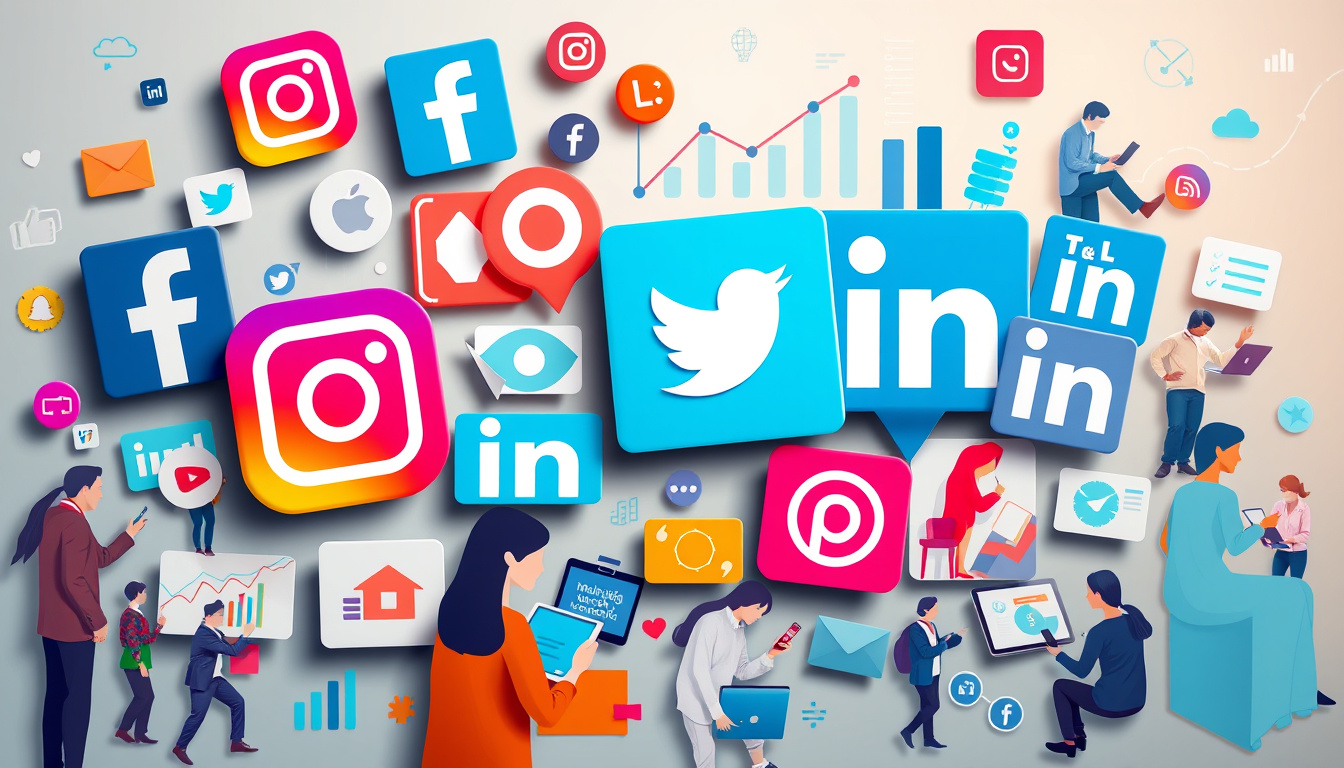📱 Social Media's Role in Digital Marketing Success to Boost Engagement

In the ever-evolving landscape of digital marketing, the role of social media has become increasingly pivotal. 📱 Social Media's Role in Digital Marketing Success to Boost Engagement cannot be overstated, as brands look to effectively connect with their audience in innovative ways. As more consumers turn to social platforms for product discovery and brand interaction, understanding how to leverage these channels is vital for any marketing strategy. In this article, we’ll explore the dynamic interplay between social media and digital marketing, delving into effective strategies, key platforms, and future trends that can enhance engagement and drive success.

Key Takeaways
- Social media has transformed the digital marketing landscape by providing new channels for brand engagement.
- Key platforms like Facebook, Instagram, and Twitter play crucial roles in reaching and interacting with target audiences.
- Implementing effective strategies can significantly enhance engagement rates across social media channels.
- Measuring success through analytics allows brands to optimize their social media efforts and improve results.
- Staying informed about future trends in social media is essential for maintaining competitive advantage in digital marketing.
Understanding the Digital Marketing Landscape
In today's rapidly evolving digital marketing landscape, understanding the pivotal role of 📱 social media's role in digital marketing success to boost engagement is essential for any business aiming to thrive online. Social media platforms not only serve as a conduit for brand messages but also foster authentic interactions with target audiences. By leveraging the vast reach and interactive nature of social media, brands can tailor their content to resonate with specific demographics, enhancing customer engagement and loyalty. Moreover, the ability to analyze engagement metrics enables businesses to refine their strategies and optimize campaigns in real-time. As such, integrating social media into an overarching digital marketing strategy is not just beneficial; it's vital for driving engagement and achieving marketing success in an increasingly connected world.
The Evolution of Social Media in Marketing
In today’s marketing landscape, 📱 social media's role in digital marketing success to boost engagement cannot be overstated. Traditionally, brands relied on television advertising and print media, but the advent of social media has transformed how businesses interact with their audiences. Platforms like Facebook, Instagram, and Twitter have evolved from mere social networking sites to powerful marketing tools that allow for direct communication and engagement with consumers. This evolution has given rise to influencer marketing, real-time customer feedback, and targeted advertising, all of which leverage the unique capabilities of social media. Additionally, the ability to track user interactions and engagement metrics has allowed marketers to fine-tune their strategies for better outreach and engagement, demonstrating that social media is not just an auxiliary component of marketing, but a central pillar of digital strategies that drive brand awareness and loyalty.
'In a world where you can be anything, be kind. And use social media to elevate others and enhance your digital marketing impact.' - Unknown

Key Platforms for Social Media Marketing
In today's digital landscape, 📱 social media's role in digital marketing success cannot be overstated, especially when it comes to boosting engagement with your target audience. Key platforms like Facebook, Instagram, Twitter, and LinkedIn each offer unique opportunities to connect with users and strengthen your brand's online presence. Facebook is essential for its vast user base and versatile ad formats, making it a prime choice for businesses of all sizes. Instagram, with its emphasis on visual content, allows brands to showcase their products creatively, while Twitter's real-time interactions enhance customer communication and brand transparency. LinkedIn stands out for B2B marketing, providing a platform to engage with industry professionals and establish thought leadership. By strategically leveraging these platforms, businesses can not only amplify their reach but also foster a community around their brand, illustrating how 📱 social media's role in digital marketing success is pivotal for driving engagement and building lasting relationships.
Strategies for Boosting Engagement on Social Media
In today's competitive digital landscape, 📱 social media's role in digital marketing success to boost engagement cannot be overstated. Engaging with your audience on platforms like Instagram, Facebook, and Twitter not only strengthens brand loyalty but also enhances visibility. To maximize engagement, consider implementing strategies such as creating interactive content—polls, quizzes, and live Q&As can spark conversations and encourage participation. Another effective approach is leveraging user-generated content by encouraging followers to share their experiences with your brand, which not only fosters community but also provides authentic testimonials. Consistency in posting is crucial too; maintain a regular schedule to keep your audience informed and entertained. Additionally, utilizing analytics tools can help you understand which types of content resonate best with your audience, allowing you to refine your strategy and focus on high-performing posts. By adopting these tactics, you can harness the power of 📱 social media's role in digital marketing success to boost engagement and develop a more interactive online presence.

Measuring the Success of Social Media Efforts
Measuring the success of social media efforts is crucial for understanding how 📱 social media's role in digital marketing success can boost engagement and drive overall business performance. To evaluate the effectiveness of your social media campaigns, key metrics such as engagement rate, reach, impressions, and conversion rates should be monitored closely. Engagement rate, which includes likes, shares, and comments, provides insight into how well your content resonates with your audience. Additionally, analyzing reach and impressions helps determine the visibility of your posts and how effectively they engage potential customers. Incorporating tools like Google Analytics or social media insights can assist in tracking these metrics efficiently. Ultimately, by systematically measuring and refining your social media strategies, you can enhance 📱 social media's role in digital marketing success, lead to higher engagement levels, and foster a larger, more interactive audience.
Case Studies: Brands That Excelled with Social Media
In today’s digital age, understanding 📱 social media's role in digital marketing success to boost engagement is crucial for brands looking to thrive. One exemplary case study is Starbucks, which masterfully utilizes platforms like Instagram and Twitter to not only promote its products but also engage with customers through visually stunning content and responsive interaction. Another notable example is Nike, whose clever use of social media campaigns, such as the 'Just Do It' slogan revitalized through user-generated content, has fostered strong community ties and brand loyalty. Similarly, Wendy’s has achieved a cult following thanks to its unique, witty voice on Twitter, allowing the brand to spark conversations while delivering promotional content in a way that feels authentic and approachable. These case studies highlight the essential role that an engaging social media strategy plays in driving brand recognition, enriching customer experiences, and ultimately leading to digital marketing success.

Future Trends in Social Media and Digital Marketing
As we move deeper into the digital age, understanding 📱 social media's role in digital marketing success to boost engagement becomes increasingly crucial for businesses. With the rapid evolution of platforms like TikTok, Instagram, and Facebook, marketers are tasked with not only keeping up with trends but also anticipating how these changes will impact consumer behavior. The rise of user-generated content and authentic influencer collaborations is reshaping how brands connect with their audiences, highlighting the importance of genuine interaction over traditional advertisement styles. Additionally, incorporating emerging technologies such as AI and augmented reality into social media strategies can create immersive experiences that captivate users, further enhancing engagement rates. As we look to the future, brands that harness the power of social media effectively will find themselves at a significant advantage, fulfilling the dual goals of increasing visibility and fostering community. By blending creativity with analytics, companies can tailor their messaging and campaigns to resonate more deeply, ultimately driving more significant marketing success.
Frequently Asked Questions
What is the role of social media in digital marketing?
Social media plays a critical role in digital marketing by providing platforms for brands to connect with their audience, share content, promote products or services, and enhance brand visibility. It enables targeted advertising, fosters community engagement, and allows for real-time feedback.
Which social media platforms are best for marketing?
The best social media platforms for marketing often depend on the target audience and type of business. Generally, Facebook, Instagram, Twitter, LinkedIn, and TikTok are popular choices, each offering unique features that cater to different demographics and marketing objectives.
How can businesses boost engagement on their social media channels?
Businesses can boost engagement by consistently posting high-quality content, utilizing interactive features (such as polls and stories), running contests, responding promptly to comments, collaborating with influencers, and analyzing audience insights to tailor their strategies.
How do you measure the success of social media marketing efforts?
Success can be measured through various metrics such as engagement rates (likes, shares, comments), reach, impressions, follower growth, conversion rates, website traffic generated from social media, and return on investment (ROI) from campaigns.
What future trends should marketers expect in social media and digital marketing?
Marketers should anticipate trends like increased use of video content, the rise of social commerce, personalization through AI, more focus on privacy, and the growing importance of influencer partnerships as consumers seek authenticity in brands.
Authored by - Abdulla Basha
Email id - mail@abdullabasha.com
Linkedin